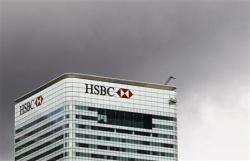 | « Back to article | Print this article |
HSBC India's website sums up the bank's business strategy quite well: "It is all about delivering sophisticated solutions to complex financial problems." Of late, however, the bank, whose origins in India date back to 1853, is grappling with problems of a different kind. The bank, which has publicly announced a target of $1 billion (around Rs 5,400 crore today) in annual profits from India in the medium term, has been hitting the headlines for all the wrong reasons.
The bank, which has publicly announced a target of $1 billion (around Rs 5,400 crore today) in annual profits from India in the medium term, has been hitting the headlines for all the wrong reasons.
It has been accused of various things - working hand-in-glove with industrialists in stashing money overseas; "erroneously" putting the name of India's richest industrialist in its list of beneficiary account holders in Switzerland; mis-selling insurance and mutual fund products and more.
Most charges have not been proved as yet and the bank's management in India has denied at least some of these, but the crisis of confidence is severe.
The foreign lender is already under lens in the US following allegations that it violated anti-money laundering rules and is likely to be fined more than $1.5 billion besides facing criminal charges.
The India operations have not been able to escape that storm. In July this year, a probe by the US Senate's permanent sub-committee on investigations found HSBC's anti-money-laundering compliance department, which included employees in India, was staffed inadequately.
Besides, deficiencies were found in the quality of the work done by HSBC's "offshore reviewers in India" used for clearing a major backlog of suspected transaction alerts at the bank.
More than a third of the alerts already resolved by the Indian reviewers and others "had to be redone" after an independent assessment by OCC (the US Office of the Comptroller of the Currency, which is the bank's primary federal regulator in the country).
The probe further found an OCC visit to India in 2007 had revealed "weak monitoring procedures" in the bank's internal control systems.
At a hearing before the Senate sub-committee on the matter in Washington, HSBC apologised for its mistakes and gave its "absolute commitment" to fix the problems.
A probe by RBI has not been able to validate this claim so far.
However, the banking regulator had penalised HSBC in April 2011 for mis-selling derivative products to its customers. The foreign lender and a few other banks had failed to carry out RBI's instructions on due diligence regarding the suitability of products and sale of derivatives to users not having the right risk management policies.
A recent media report also said the bank has stopped selling insurance and mutual fund products in India following claims of mis-selling